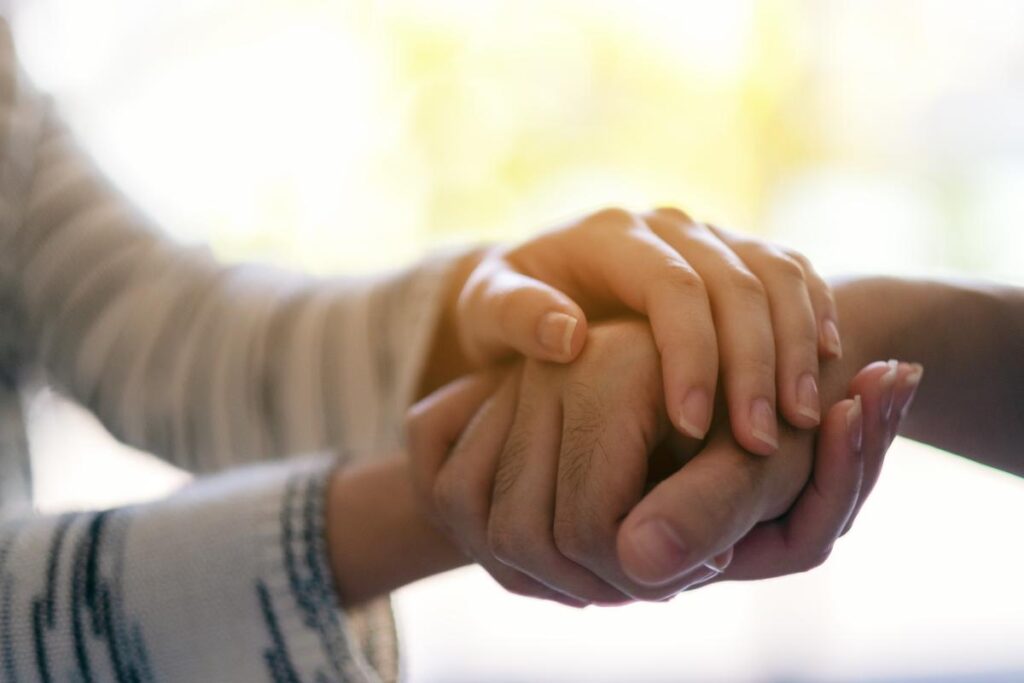When dealing with a codependent relationship, it’s crucial to look at how it began and what factors created it. Trauma and co-dependency frequently go hand-in-hand with childhood trauma causing codependent symptoms in later life. But what can you do about it? To understand the causes of trauma and co-dependency, discuss your concerns with a compassionate expert at the mental health treatment center.
The Ranch Tennessee offers a trauma-informed therapy program that could be suitable for you or your loved one dealing with trauma. Call our team today at 1.844.876.7680 for more information on our trauma-informed therapy program.
What Is Co-Dependency?
Co-dependency is a dysfunctional relationship dynamic in which one person’s needs are secondary to another’s. Typically, co-dependency occurs when true intimacy does not. It is commonly developed in relationships with an addicted individual but also evolves in other relationships with people who are somehow emotionally unavailable. Relationships in which some traumatic bonds, such as those involving physical, sexual, or emotional abuse, can also create co-dependency in the victim.
Codependent from Trauma
Co-dependency usually involves negative behaviors, feelings, and thoughts about oneself and others. Codependents are typically passive and submissive rather than active or assertive in their interactions. They seek others’ approval, try to appease others, and care for others to avoid conflict, rejection, and abandonment. When people are codependent from trauma, they have learned these behaviors to cope with it.
A codependent from trauma is someone who has experienced trauma and, as a result, developed certain behaviors. These trauma-induced codependent behaviors can be incredibly harmful to both the individual and their relationships. Some of these behaviors can include:
- People pleasing
- Needing to be needed
- Low self-esteem
- Difficulty setting boundaries
- Trying to control others
- Excessive caretaking
- Rescuing others
If you or someone you know is struggling with trauma and co-dependency, it’s essential to seek professional help.
Feelings of Co-Dependency and Related Behaviors
Individuals who use codependent behaviors have many chronic negative feelings. These include feelings of insecurity, incompetency, anxiety, depression, poor self-esteem, helplessness, hopelessness, and emptiness. Additionally, there is often a sense of impending doom and the need to avoid it by engaging in compulsive behavior. Although codependents typically feel compelled to take action to “fix” problems, compulsive behaviors tend to create other issues since their efforts to help others can be misguided and ineffective.
Often codependents will attempt to solve problems for others that can only be solved by others taking personal responsibility. This is particularly true when codependents attempt, for example, to control another’s substance use or similar behavior. Many codependents are active to the point of chronic fatigue and exhaustion. Compelled by a need to care for others and manage their anxiety and emotions, they are routinely overly responsible.
Consequently, they do not attend to their basic needs for rest, relaxation, and stress management. Feelings of incompetence, helplessness, and hopelessness can become pervasive and interfere with pursuing appropriate life goals.
Effects of Trauma and Co-Dependency
Trauma and co-dependency can take their toll in all areas of one’s life. A prolonged period of poor self-care and focusing on the needs of others creates emotional, behavioral, and psychological problems in all relationships. Co-dependency within the family affects occupational and social functioning outside the home as the interpersonal boundaries of codependents manifest there as well. Additionally, many physical problems can result from codependent relationships and behaviors since poor self-care involves inadequate stress management and ineffective management of one’s emotional health.
It is not unusual, for example, that codependents develop substance disorders, eating disorders, and other compulsive behaviors that cause significant problems in all relationships and all realms of daily life. Consequently, codependents may incur substantial losses and missed opportunities. Normal social, emotional, and psychological development can be interrupted, making completing personal goals unattainable.
Co-dependency makes one vulnerable to forming relationships of abuse and staying in them after abuse develops. Many codependents rationalize their abusers’ behavior by assuming responsibility for it.
Co-Dependency and Self-Sabotage
People with trauma and co-dependency can be significantly at risk of sabotaging their life goals. They may engage in self-defeating or self-harming behaviors to manage anxiety, depression, emptiness, and other feelings resulting from co-dependency. Substance use, eating disorders, sexual acting out, and intentional self-injury are some high-risk behaviors that may be used to combat the negative inner experience of co-dependency.
Similarly, co-dependency may lead some to dysfunctional relationships throughout their lives in which their unhealthy behaviors cause chronic difficulties in functioning that derail ambitions, hopes, dreams, and achievements. Participating in unhealthy relationships naturally results in dissatisfying life experiences. However, some become involved with controlling, manipulative, or abusive individuals that cause emotional, psychological, and physical harm to themselves and other family members.
Getting Help for Trauma and Co-Dependency at The Ranch Tennessee
If trauma and co-dependency negatively impact your life, The Ranch Tennessee can help. We offer several programs specifically designed to address trauma and co-dependency, as well as the underlying causes. Our trauma and co-dependency treatment program includes:
- A comprehensive assessment to determine the severity of your symptoms and the best course of treatment
- A team of trauma and co-dependency experts will create a personalized treatment plan for you
- A variety of therapies, including individual, group, and family therapy, to address trauma and co-dependency
- Education on trauma and co-dependency to help you understand your condition and learn healthy coping
Our treatment center is equipped to handle the mental health results of trauma and substance abuse. The following programs address issues of trauma and co-dependency:
- Dual diagnosis treatment
- Individual, group, and family therapy
- Life skills training program
- PTSD treatment program
Call our experts at 1.844.876.7680 to regain control of your life.

